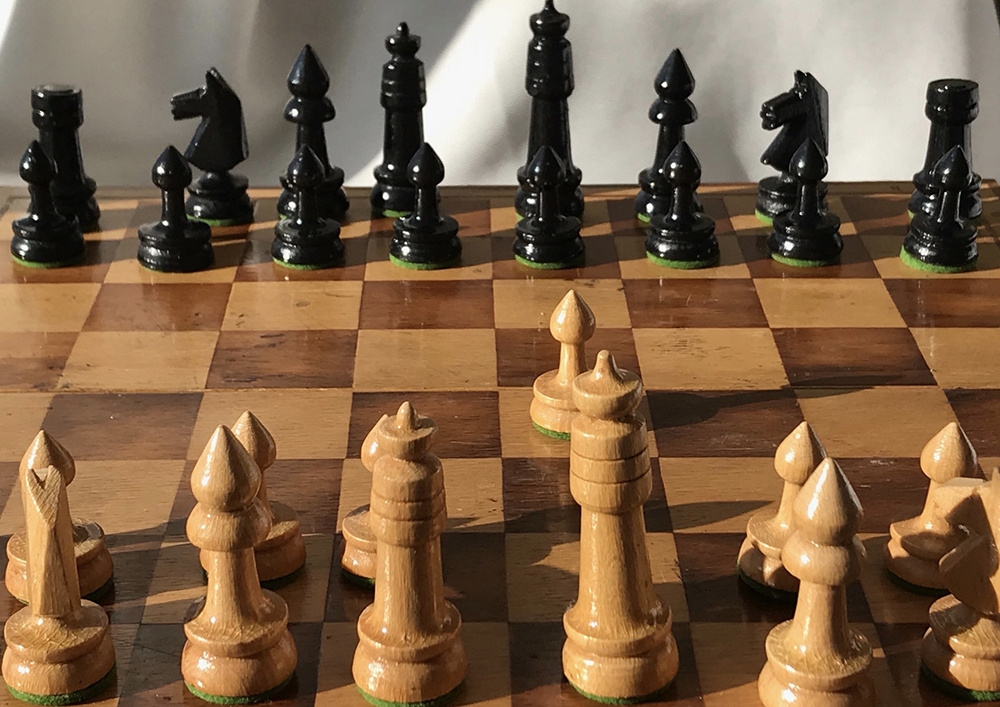Geneva, 10 December, 2020

We recently dug out a long-forgotten chess set and gave it a go. Chess is a truly wonderful thing. It may be the only board game that does not carry an element of luck; to win or to lose is totally determined by mental abilities.
In the first lockdown, I noticed that the corner of a nearby park normally dedicated to open air chess was deserted and commented that, over the years, I had only ever seen men playing there. I had a stab at why the game holds less attraction for women.
Many have turned to chess this year. The evidence is that eBay has seen chess sales going up by 60% after the onset of the pandemic. According to a spokesman for the International Chess Federation, on-line chess was already booming due to the confluence of live streaming technology and video game culture. At the beginning of the year, as many as 11 million chess games were played on-line every day; when the pandemic hit, this grew to more than 16 million games per day.

Like many others, I first subscribed to Netflix this year. Forbes has reported that the television streaming giant gained 26 million new customers in the first half of this year. The pandemic has precipitated the company’s biggest ever growth spurt. One its most successful productions is a screen adaptation of Walter Tevis’s 1983 chess novel, the Queen’s Gambit. The October debut of this absorbing miniseries came hard on the heels of the lockdown chess revival. The spokesperson for eBay reported another 215% increase in sales of chess sets and accessories since the first episode.
The story of the Queens Gambit is about a young American girl, Beth Harmon, born with a natural gift for chess. As a teenager, she goes on to beat the Soviet Union’s World Champion, Vasily Borgov. However, it is not the against-all-odds-feel-good watching that one would expect. The story encompasses grief, loneliness, drug addiction and alcoholism on the part of the main protagonist.

Another Netflix blockbuster is The Crown. Its success rides on the endless and world-wide (and for me inexplicable) fascination for the British royal family. It must be the first TV or film production in which, at every stage, the viewer is constantly asking themselves “Blimey, did she really say that? Nah, he wouldn’t have done that, would he?” Basically, it is one great lavish very entertaining soap based on some facts and with characters who happen to be royal, instantly recognisable, privileged and rich beyond imagination. Unfortunately, by watching, the viewer becomes complicit in the passing off of many fabricated scenes as history. The Crown should carry a fiction warning.
The issue of mental health is upfront in this series as well. It turns out that two distant cousins of Prince Philipp were incarcerated in an asylum from a young age. Princess Margaret’s drinking and suicide attempt are highlighted along with Diana, Princess of Wales’s bulimia. Warnings of scenes relating to an eating disorder precede some episodes.
These two series make for great television for when one has to stay at home. They prompted me to search around for any valid information about the mental health impact of having to stay at home because of the pandemic.
The BBC has spoken to experts who predict that those already subject to obsessive-compulsive disorders may become chronic “germaphobes.” Anxiety will be exacerbated among those who already suffer high anxiety levels.
Antonis Kousoulis and colleagues published a review of existing evidence of the mental health impact from past epidemics and pandemics. They emphasise that the many mental health issues likely to arise from this pandemic must not be ignored. They warn that isolation and social distancing may increase the likelihood of alcohol and drug misuse and online gambling. They predict “a higher concentration of social determinants” associated with self-harm and suicidal ideation; these determinants include stress, financial worries and relationship discord.
Ann John and colleagues have recently reviewed all studies with respect to suicide rates during the pandemic. Whilst many predictions of increased rates of suicide have been published, it turns out that in high income countries, the suicide rate is unchanged and might even have fallen.
A British law firm, Stewarts, who specialise in divorce, logged a 122% increase in enquiries between July and October, compared with the same period last year. A charity, Citizen’s Advice, reported a spike in online enquiries about how to end a relationship. In the US, a major legal contract-creation site, Legal Templates, recently announced a 34% rise in sales of its basic divorce agreement as compared with last year. Couples married in the previous five months are responsible for 20% of sales.
There have been a number of articles predicting an increase of domestic abuse, mostly of women, during lockdown. Those already vulnerable to domestic abuse are, apparently, likely to suffer further because of living in isolation with their potential abuser. The data confirming these common sense warnings seem to have two sources. The first is a study in one hospital in Massachussets, USA that reported a doubling of radiologically confirmed domestic abuse cases as compared with previous years. The second is a massive surge in calls to Refuge, a dedicated UK charity helpline. There are multiple on-line references to a UN report of a 20% global increase in domestic abuse during the pandemic. I cannot find the source of this. To arrive at this figure reliably would involve a huge, complex and time consuming study.
With respect to drinking habits, all data point to increased on-line and carry-out sales of alcohol during the lockdown. Obviously, because people are not going out, they are drinking more at home. I got nowhere in researching how this might eventually translate into heavier drinking or alcoholism. For me, it’s best summed up by a conversation with two friends during the lockdown. We recognised that the question “Shall we open a bottle of wine this evening?” had given way to “Which bottle of wine shall we open this evening?”
All to say, whilst we battle this extraordinary global emergency, we can predict and should all be aware of its mental health implications. As yet, though, we have barely any quantifying data.
In January this year, Netflix streamed a series of documentaries entitles “Pandemic: How to Prevent an Outbreak.” Yes, in January! Wow! Now that we’ve finished the Queen’s Gambit and the Crown, we might watch Pandemic. It’ll be fascinating to see if they predict the need for lockdown and a risk of accompanying mental health issues.
I hope all readers of these Chronicles are as healthy and happy as possible under the circumstances. Go well. Be wise.
